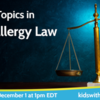Kids With Food Allergies (KFA), a division of the Asthma and Allergy Foundation of America, hosted a webinar on December 1, 2015 called Current Topics in Food Allergy Law. Our webinar featured the Allergy Law Project. The Allergy Law Project is a blog run by three lawyers, all of whom have personal experience with food allergies: Laurel Francoeur, Esq., Mary Vargas, Esq. and Homa Woodrum, Esq.
The three attorneys shared their legal perspective about the connection between the law and food allergies in areas such as:
- Places of public accommodation
- Restaurants and travel
- School
KFA thanks Allergy Law Project for generously donating their time to prepare this webinar. We also thank Sanofi for providing an unrestricted sponsorship to KFA for this presentation.
Allergy Law Project answered a question after the webinar about what accommodations restaurants have to make for people with food allergies.
They told us:
Most restaurants are considered “public places” under Title III of the Americans With Disabilities Act and therefore have to accommodate people with disabilities. A disability is a physical impairment that substantially limits one or more major life activities.
The determination of whether a person has a disability is established on a case-by-case basis. What would those accommodations look like for a person with food allergies?
According to the Department of Justice:
“A restaurant may have to take some reasonable steps to accommodate individuals with disabilities where it does not result in a fundamental alteration of that restaurant's operations. By way of example only, this may include: 1) answering questions from diners about menu item ingredients, where the ingredients are known, or 2) omitting or substituting certain ingredients upon request if the restaurant normally does this for other customers. A fundamental alteration is a modification that is so significant that it alters the essential nature of the good or services that a business offers. For example, a restaurant is not required to alter its menu or provide different foods to meet particular dietary needs.”
So if a restaurant usually changes its menu for customers with dietary needs, it may also have to make changes for people with food allergies. However, if the alteration is overly burdensome (like using separate equipment or expensive ingredients), the restaurant may not have to make any changes.
If you are fortunate to live in a state that has food allergy restaurant legislation (such as Massachusetts or Rhode Island), you can expect a little more attention. In those states, restaurants are required to have at least one staff member trained in allergy awareness, display posters describing food allergies, and must post on their menus that customers must inform the staff of their allergies. Although they have more allergy awareness, they still may not have to make changes to their menus.
Are customers with food allergies allowed to bring in outside food? For the answer to that question, please check the Allergy Law Project page in a few weeks!
RESOURCES
Kids With Food Allergies Support Forums
Visit our new mobile-friendly community and find the help you need quickly and easily!
504 Plans, IHCPs, ECPs: Food Allergy Health Care Plans Explained
What are 504 plans, IHCPs and ECPs? What are the laws that address the needs of students with food allergy in schools?
10 School Planning Tips When Your Child Has Food Allergies
A must-have, step-by-step guide to preparing for a safe school year.
PAST WEBINARS
About Section 504 Plans for Students with Food Allergy (August 2014)
Food Allergy School Health Plans: 504 vs IHCP (January 2014)
Flying with Food Allergies (June 2014)
OTHER RESOURCES (leave the KFA website)
Allergy Law Project
Connect with Laurel Francoeur, Esq., Mary Vargas, Esq. and Homa Woodrum, Esq.
State Honor Roll
The 2015 State Honor Roll of Asthma and Allergy Policies for Schools describes states with the best public policies regarding school management of asthma, food allergies, anaphylaxis and related allergic diseases.
AAFA.org
Research, advocacy and educational resources. AAFA is the nation's oldest and largest nonprofit for allergic diseases.
ACAAI.org
Find a board-certified allergist via the American College of Allergy, Asthma & Immunology (ACAAI).
AAAAI.org
Find an allergist in your local area via the American Academy of Allergy Asthma & Immunology.
YOU MAKE OUR PROGRAMS POSSIBLE!
The generous support of our donors allows us to reach families who need our help. A webinar attendee recently told us: "I really enjoyed this seminar and will forward the link when it is available for others to view.Thank you for doing this as you make a HUGE difference for so many lives!"
You enable us to give families managing food allergies the information they need to keep their children safe and healthy. Please give generously!
Donate Now - Please give generously!


Comments (2)